Wednesday, January 30, 2008
Podcast Mike Explosion
Suddenly USB microphones, allowing podcasters to plug into a laptop and record their show, are everywhere - at least everywhere at this show.
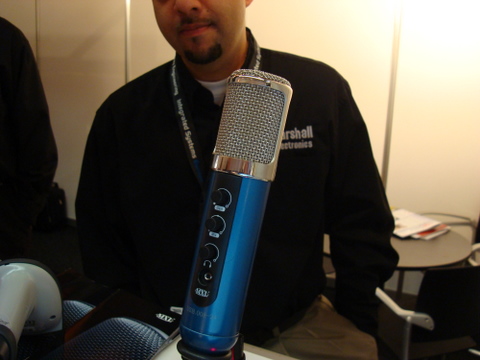
ISE - Pleasantly Surprised
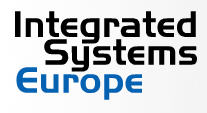
Went to the Amsterdam show for professional audio and video "integrators" and found it to be excellent. Not too big like broadcast shows, but big enough for the big names like Sony, Tandberg to be there. A lot of the technology these guys are using is excellent quality - but much cheaper than you find (so far) in the broadcast market. Perhaps that's why we bumped into some of the local broadcasters like RTL who have also discovered this show. I think this show will replace some of the audio-only shows like AES. Audio cannot survive as stand-alone.
Tuesday, January 29, 2008
Greedy Wine
Monday, January 28, 2008
Steve's Boom Video
I watched videos of myself and realised I had fallen into the trap of saying "right" too often. His Steveness seems to have a love for Boom.
Sunday, January 27, 2008
Great Series - Coast
The BBC and the Open University in the UK are now up to their third series about the Coast of Britain - and it is one of the best examples of what public TV does best, explaining the UK's heritage. I have bought all the programmes on DVD and dip into them again often. My favourite is episode 7 of Series Three which explores the Y-service stations (taking Sheringham, Norfolk as an example, though spelling it Sherringham for some reason) and the clever montage work to explain the secret Cobra Mist radar station at Orfordness, currently the home of BBC's World service outlet on 648 kHz. This shot shows how it must have looked like around 1971, though any aircraft getting this close in those days would probably have been shot down. These days no aircraft fly near the mediumwave masts, which is why they can save money and not bother to put any lights in them.
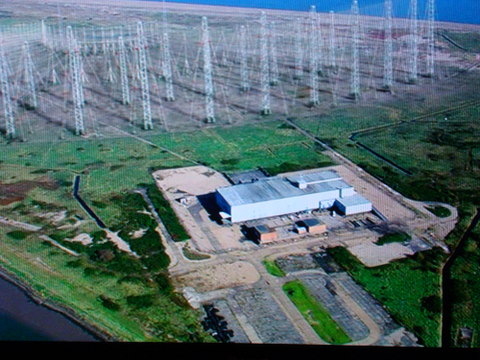
Cutting the Costs of the Masts

The UK Sunday telegraph newspaper says that Arqiva, which currently owns half of Britain's radio and TV masts is offering to slash its prices in a move that could secure regulatory approval for its £2.5bn merger with rival National Grid Wireless and provide a boost to Britain's ailing commercial radio industry.
The company is owned by Macquarie, the Australian bank - and they are pledging to cut the cost of transmitting all radio stations by an average of 15pc if the merger is approved, according to commercial radio sources. The BBC and commercial radio spend a combined £100m a year broadcasting radio in FM, AM and digital formats. The BBC's contract is with National Grid Wireless, but the offer of a price cut is understood to apply to the BBC as well.
Broadcasters would also be able to cancel contracts for the first time, once capital costs have been recouped, with one year's notice. The break clause would be introduced as part of new 10- or 12-year agreements. This would make it easier to shut down loss-making digital stations, or those broadcast in AM on mediumwave, which have a dwindling audience. I have a feeling if this goes ahead, many spots on the UK mediumwave band will go dark. And what of the DRM test down in Devon - I cannot believe that has been a success.
Arqiva agreed last April to acquire rival National Grid Wireless in a move that would create a monopoly for the transmission of all radio and terrestrial TV in the UK. The Competition Commission is investigating, and in November warned it might order Macquarie to sell off National Grid Wireless. A final decision is expected in March.
To avoid a forced disposal, Macquarie is hoping to reach an agreement that can be proposed jointly with the radio companies to the commission. The cut in transmission costs is designed to pass on savings from the merger.
Radio companies are desperate to cut the amount they spend on transmission, particularly for digital stations. They have spent millions buying up local, regional and national digital licences and committing to 12-year transmission contracts with Arqiva in the hope that listeners would throw away their old analogue radio sets. However take up has been disappointing.
While digital TV is in more than 86pc of homes, just 20 percent of adults own a digital radio. In the past six months, loss-making digital stations have been going off air. UBC Media has closed the national speech station Oneword, GCap has closed Core and is due to close Life. Virgin Radio has scrapped plans to launch a women's station, Virgin Radio Viva. GCap spends a total of £25m a year on transmitting all its stations, and could save up to £4m under the new terms.
Voice of America 2.0? Charter is Void When Inconvenient

Sometime in the mid 1980's, I remember being rung at 3 AM by Charles Z. Wick, then Director of the US Information Agency at the time when VOA has just started its VOA Europe service. As a journalist, I had put in a call to question the wisdom of this idea to "correct the image of the US amongst the minds of European youth". Charles was having problems understanding time zones. VOA Europe later had a much bigger problem with the programming - mixing Madonna (the Music) with short radio features on American life, about firestations in Pennsylvania ("the More").
Since the programming wasn't culturally sensitive, and the DJ's were trying to sound "local" from a studio 6 times zones away in Washington, the project of "government-people" communication failed miserably, ending up as filler on some of the emerging private stations in Eastern Europe. These station owners liked the music, but replaced the VOA News with their own bulletins. VOA Europe has long since gone. But Radio Farda and Radio Sawa are doing a similar kind of thing in Iran and the Middle East respectively.
Actually, Radio Farda and Radio Sawa are much cleverer in their programming than VOA Europe ever was, their problem is that their success is linked to the credibility of the US in that region as a whole - and that has never been lower.
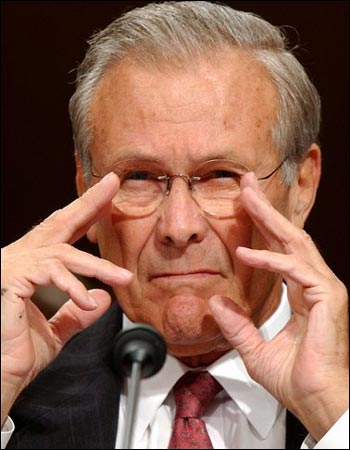
Now it would seem Donald Rumsfeld (yes, it is he) believes a new form of propaganda agency is needed - presumably not to reach old Europe, but South Asia, Middle East and Latin America. Wired carried a piece on it last week, quoting Rumsfeld at the press conference.
Private media does not get up in the morning and say what can we do to promote the values and ideas that the free Western nations believe in? It gets up in the morning and says they're going to try to make money by selling whatever they sell... The way they decided to do that is to be dramatic and if it bleeds it leads is the common statement in the media today. They've got their job, and they have to do that, and that's what they do.
We need someone in the United States government, some entity, not like the old USIA . . . I think this agency, a new agency has to be something that would take advantage of the wonderful opportunities that exist today. There are multiple channels for information . . . The Internet is there, blogs are there, talk radio is there, e-mails are there. There are all kinds of opportunities. We do not with any systematic organized way attempt to engage the battle of ideas and talk about the idea of beheading, and what it's about and what it means. And talk about the fact that people are killing more Muslims than they are non-Muslims, these extremists. They're doing it with suicide bombs and the like. We need to engage and not simply be passive and allow that battle of competition of ideas.
Remember it is not the first time the US government has played with clandestine radio and propaganda. They first ran Radio Swan just before the Cuban invasion, then a series of stations in the 1980's from Honduras, aimed at Nicaragua. Rumsfeld actually tried a version of this himself in Iraq, the results of which were a disaster. The Pentagon hired the Lincoln Group to pull off a propaganda campaign designed at discrediting the insurgency. This amounted to planting fake news stories in the Iraqi press written by soldiers that said things like the insurgents "crawled on their bellies like dogs in the mud." For this, the Pentagon spent more than US $25 million.
When war breaks out, the US always brings in their psycological warfare teams and fly planes over the area to persuade locals they are the friend not the foe. They use radio and leaflets. In the first Gulf war in 1991 they were active as I reported on Radio Netherlands' Media Network show
At first glance, the dull grey propeller-driven E-130 aircraft converted from cargo service, looks as slow and clunky. But Commando Solo II is in fact a special modified US$70 million plane, where the fuselage has been stuffed with computers, radio and TV production equipment, and quite powerful radio and TV transmitters. This gear allows the plane's 11-man crew to jam selected TV and radio broadcasts and substitute messages - true or false - on any frequency.
Commando Solo has already been battle-tested by the 193rd Special Operations Group, an Air National Guard unit based in the US state of Pennsylvania. During the Persian Gulf War, the plane's crew broadcast radio reports on military frequencies targeted at Iraqi soldiers, including some of the next areas to be targeted by US bombers. As a result, it is claimed, many Iraqi soldiers deserted those positions. To prepare Haiti for the US intervention there, Commando Solo beamed in radio and TV messages from deposed President Jean-Bertrand Aristide. Each broadcast began with the crow of a rooster, the symbol of Aristide's political party
In the second Gulf war, the airplanes went home too early, leaving the airwaves wide open to their enemies. Iran moved up mobile transmitters to the border with Iraq and used TV to fill the gap left by the demise of the old Radio TV Baghdad.
So, yes, the US seriously needs to review its overseas public diplomacy efforts. But the Rumsfeld approach is not the way of the 21st century and 2008 is not the year to be doing it.
Friday, January 25, 2008
Great to have Gerd here
Wednesday, January 23, 2008
Top of my NYC restaurant list
Interesting to hear the name of a restaurant mentioned on-stage at DLD which I was fortunate to visit a few years back. Veritas has the most amazing wine list I have ever seen. Yes, it is expensive (although with the dollar being at a record low, the value for us Europeans is actually a lot better than it was).
Veritas Restaurant
43 East 20th Street,
New York, NY 10003
Telephone (212) 353-3700 for reservations. Good luck getting in!
I have no connection with them. Just been a customer when I have been in the area.

Veritas Restaurant
43 East 20th Street,
New York, NY 10003
Telephone (212) 353-3700 for reservations. Good luck getting in!
I have no connection with them. Just been a customer when I have been in the area.

Tuesday, January 22, 2008
I am the boss - you're nothing
Great sign at this newspaper stand just opposite the Rathaus. Going to catch the train back to Munich airport
Suranga Chandratillake, Blinkx
Great guy - and one of the few with open books on how much they are really earning in the new media business. Great search engine - check it out at www.blinkx.com. Been a fan for a couple of years now. It's the remote control for the web.
Vacuumly Sausage Extraction
Ouch. Intestines sucked out at your command. Sign in the butchers window in central Munich.
Blinkx Business
Link: sevenload.com
Most interesting part of this session is the way Suranga Chandratillake explains his company Blinkx (around 10 minutes into the video), the blind-men-and-the-elephant story (14'50") and the bit around 44 minutes 12 seconds where he reveals the turn-over for Blinkx is US$4 million for 2008, this year is heavily loss-making because they went through the IPO in 2007, so their costs are over "double" the 4 million. They plan 12-20 million dollars turnover in the coming years. Not quite Google, but their audio-video search technology is very clever and has huge potential. A company to watch - with 18 million hours of content.
Martin Sorrell identifies the elephant in the room. New media companies won't disclose their revenues. Only Blinkx came out with the figures.
Best Dancers at DLD Party
Pablos Holman is a fascinating hacker - but one hell of a dancer too. The lady is from www.ninemillion.org
Monday, January 21, 2008
Amy Macdonald At Bayerischer Hof Hotel
Different guitar with every song. Great player. Powerful singer. Enjoyed the performance at the DLD party tonight.
Handy Tripod at DLD Party
So how do you get great shots of Amy McDonald? Like this! Unused tripod at the back of the balcony, pressed into good service.
New friends at DLD
DJ Howie B (left) is just a great guy..drove the DLD Party with passion. Also Gabe from Xolo, Laurent from LIFT-08, Barry Flaherty and Jonathan Kenny from Sangha-Solutions. Jonathan was happier (and a lot funnier) than the photo suggests.
Martin Varsavsky
Really enjoyed chatting to Martin Varsavsky this afternoon, who is an Argentine/Spanish entrepreneur, founder of seven companies in the past 20 years. He thinks that many countries in Europe are missing the vital ingredient - risk!
Martin’s current venture is FON, a young and innovative WiFi start up founded in February 2006 and headquartered in Madrid, Spain, with some 100 employees located around the world. FON’s mission is to make WiFi universal and free by creating a unified global community of members who share WiFi. The community already has more than 550,000 members throughout the world.
Martin’s current venture is FON, a young and innovative WiFi start up founded in February 2006 and headquartered in Madrid, Spain, with some 100 employees located around the world. FON’s mission is to make WiFi universal and free by creating a unified global community of members who share WiFi. The community already has more than 550,000 members throughout the world.
Most Frightening Presentation at DLD-08
Link: sevenload.com
If you have just received a letter from your credit card company, plus a new RFID enabled credit card, take a look at what Pablo Holman has to say during the first few minutes of this video taken from a session at DLD this year. Yes, the secret credit-card information is encryoted on the card. But Pablo shows that it is all decrypted by a simple RFID reader he got for US$8 on ebay. He recommends putting your credit cards into a stainless-steel holder so0 that it cannot be read by rogue readers. Next year, he quipped, he can put the same reader at the door of the theatre and grab all the credit card numbers and expiration dates of the people entering the lecture theatre. His group, which I term "Hackers for the good side of society" can clone RFID passports already.

Starbucks claims the line moves 3 times as fast if people don't have to get a credit card out of their wallet. I'll stick to mine in the stainless steel carrier if you don't mind. I think there are other ways for Starbucks to solve its transaction problem - like an optical code read by a scanner. Some people already have the solution.
Sunday, January 20, 2008
DLD Conference - Day 1. Little Hope for Western Europe
Link: sevenload.com
I really enjoyed Martin Sorrell's contribution to the first session of DLD in Munich today, an invitation only event organised by Burda Media. They are a large publisher of fashion, economic and lifestyle magazines - but increasingly branching into electronic media and social networks.
Martin was by far the most business-like and concise in this panel session which kicked off the conference. What he has to say starts around 24 minutes in on the video-player above. It is worth a few moments of your time to hear what a major advertising/communication groups (WPP) thinks about the future of advertising and the media and how geography, technology and the coming recession.
WPP is watching the huge cyclical powershift where the balance of power is shifting back to China and India. Some predictions say that this area of the world will account for half of the world's GNP by the year 2025. That's bad news for most of Western Europe - but WPP is betting its future of the company on Asia, Latin America and on Central and Eastern Europe. The G7 may only have one European member shortly, (the UK). Europe is operating at two speeds...like treacle in the West, much, much faster in Eastern and Central Europe. Western Europe has heritage, music and culture - but on the innovation front it cannot compete with the wave of PHD students coming out of Beijing and Bangalore.
I would say that the the reality is that they are already beating the hell out of those in France, Germany and the Netherlands in terms of teaching and academic standards. I find it incredible that there are so few people at Universities in Europe studying what is happening in China and South Asia. And it is interesting that many who are, turn out to be second generation Indians and Chinese who's parents came to Europe in the 1960's. But back to DLD.
Sorrell then went on to examine his "Frenemy" or "Froe", Google, which has grown at an astounding rate in less than a decade. The top 4 companies in the communications-advertising business have a combined global revenue of around 33 billion dollars. They have a combined market cap of around 40-45 billion. Google has revenues of between 17 and 22 billion dollars (depending on who you believe) and a market cap of around 200 billion dollars (even taking into account the market dip of the first few weeks of 2008). So they already have 5 times the market cap and 2/3rds of the revenues of the traditional firms. No wonder they have got traditional companies worried. They understand contextual advertising which the traditional media have so far ignored.
WPP revenues are around 12 billion dollars of which 3 billion are now digital and that is the only sector that is growing. They know that WPP clients in 2008 will spend about 10% of their budgets on digital activities. This can only grow as people under 30 are spending 20% of their time online. Sweden will shortly be the first country where Internet ad-spending exceeds TV, with the UK following later in 2008.
WPP is not worried about the technology being developed in Europe...far more about the ideas coming out of garages in Bangalore and Beijing. The recession will not happen in 2008 for the advertisers - the Beijing Olympics and the US presidential elections being important, as well as the European football championships. But the real issue is what happens in 2009 - the 10% growth cannot continue indefinitely in China and India. The new president in the USA will have to tackle the thorny issue of the economy and traditionally this is done in the first year of a presidency.
Members of the panel also point out that the success of Silicon Valley is due to the second generation immingrants - especially Isrealis, Indians and Northern Europeans working in the 40 km radius around Palo Alto. But now, the sons of immigrants no longer need to travel to the USA from their home countries to be successful. WPP is keeping its eye on the so-called Next 11 Countries, which includes Turkey and Indonesia, as well as the so called BRIC countries.
Finally, Sorrell warns us not to underestimate the ability for the US to change. There lies entrepreneurship. We thought it might also be in Japan in the 1970's and 80's, but in fact we were wrong..
Here's the list
Bangladesh: (Developing country)
Egypt: (Newly industrialized country, ENP, COMESA, G-20 developing nations member)
Indonesia: (Newly industrialized country, G-20 industrial nations member)
Iran: (Developing country)
Mexico: (Newly industrialized country, NAFTA, G8+5, G-20 industrial nations member, OECD member (1994))
Nigeria: (Developing country, G-20 developing nations member)
Pakistan: (Developing country, G-20 developing nations member)
Philippines: (Newly industrialized country, G-20 developing nations member)
South Korea: (Developed country, Advanced economy (CIA and IMF), G-20 industrial nations member, OECD member (1996))
Turkey: (Newly industrialized country, Developed country (CIA), EU Customs Union, G-20 industrial nations member, OECD member (1961))
Vietnam: (Developing country)
Sir Martin Sorrell is chief executive and architect of WPP, one of the world’s largest communications services groups. Collectively, WPP employs 102,000 people (including associates) in more than 2,000 offices in 106 countries. Unlike many communications agencies I have dealt with in the past, these guys know exactly where it is going - towards dynamic advertising.
Martha's Bizarre Briefing
Link: sevenload.com
This was definitely the most bizarre talk at DLD-08. Martha Stewart basically opens her suitcase and shows the technology she carries with her..most of it in plastic bags which reminds me of the "sterlized for your protection" sign in US hotels. Someone didn't clue her in as to who was sitting in the audience. Quite a few escaped to the networking centre outside. Her interview in the second half was a bit better, but this bit makes you wonder if we share the same planet.
DLD Networking
Link: sevenload.com
Despite the plane delays yesterday, the KLM flight from Amsterdam to Munich went without a hitch. I'm at DLD and helping to upload the 21st century inside a rennovated bank in the heart of Munich. High pressure networking down below. And this is a Sunday!
Saturday, January 19, 2008
Struggling with Plan B
I was on a delayed flight from Bergen, Norway last night with colleagues who were trying to find out if their KLM connections in Schiphol, Amsterdam were also delayed by the bad weather in the Netherlands or whether they could start making alternative plans in Norway - perhaps by booking a last minute easy-jet flight.
So there we were in Bergen airport with no wifi connection but a mobile phone. So, I take out the Gold card Flying Blue KLM loyalty card and phone the helpline in France for information. I have to enter my account number and hold for 3 minutes. The person in Paris seems to have a screen in front of him with status details - puts me on hold a couple of times - and then (as it turns out later) gives me a whole string of incorrect information. The plane to the Middle East is delayed by 3 hours I am told. No it is isn't. It is boarding on time when we get to Schiphol. It was never delayed.
So why on earth can't Schiphol talk to KLM - and get this information to KLM websites, mobile services and personnel? Lack of information MUST come out of surveys as being a top frustration for people on a schedule. If TripIt and other such travel sites want to help, this is a serious area they can focus on.
When I am next in a fix like this, I know who I am not going to call. Flying Blue.
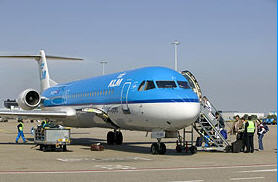
So there we were in Bergen airport with no wifi connection but a mobile phone. So, I take out the Gold card Flying Blue KLM loyalty card and phone the helpline in France for information. I have to enter my account number and hold for 3 minutes. The person in Paris seems to have a screen in front of him with status details - puts me on hold a couple of times - and then (as it turns out later) gives me a whole string of incorrect information. The plane to the Middle East is delayed by 3 hours I am told. No it is isn't. It is boarding on time when we get to Schiphol. It was never delayed.
So why on earth can't Schiphol talk to KLM - and get this information to KLM websites, mobile services and personnel? Lack of information MUST come out of surveys as being a top frustration for people on a schedule. If TripIt and other such travel sites want to help, this is a serious area they can focus on.
When I am next in a fix like this, I know who I am not going to call. Flying Blue.

Tuesday, January 15, 2008
Bush Announces New Currency
Now that gold has hit an all time high, Bush has announced a new currency it seems. This video explains all. The 5 gallon coin is my favorite. Well produced for US National Lampoon.
Monday, January 14, 2008
Realistic Scenarios
Interesting, and worrying video up on Youtube. This link is not the original unfortunately. Reasoned argumentation about why doing nothing about climate change is infact too easy. The person who posted it says it is not them in the video and by renaming it as the most frightening video you'll ever see has, of course, got a huge amount of traffic. Worth watching, especially when he gets to the whiteboard. If you find the original author in your travels, please let me know.
Sunday, January 13, 2008
Big Screen Marks
woah...the audio was great, but I have seen better webcams. I must also learn to sit still. But concentrating too hard on the voice down the other end of the phone. It was a good quality debate in the end. Amazing how it did not end up talking about the issues like Blu-Ray DVD versus HD-DVD, and all the other bling that's around Lost Wages. Here's a bit of what I was trying to say on air...
Personally, I think the CES is going in the wrong direction, a bit like the Funkaustellung in Berlin in September. The first two days are a complete zoo, far too crowded, and much too expensive for the ordinary person in the street (they hike the hotel prices, just like NAB in April). May be this is the next Comdex - one year, no-one will come. Everyone is obsessed with “shiny” new things. Frankly, I am more interested in relevant technology
Went once to CES. Never again. Stay at home and watch it come to you instead. Something like 7000 journalists are there. The best gadgets I saw in coverage were enhancements of something already invented.
Things like intelligent LED lighting getting into big screen televisons to save power....but also into the home in the form of light bulbs. Philips is big on this, although they are messing around with 3DHD at the moment and frankly I am not impressed.
Energy is a huge problem facing us and I think we could do a lot more to make computers more energy efficient, especially if they could run hotter without breaking down. Much as I admire OLPC, I fear the Intel competition may win bigger contracts.
Blu Ray will win the high-definition war. Glad I chose the right system (by default - it is the Sony PS3).
I like misusing consumer technology for work I’m doing in Africa. I have found an MP3 stick with quite a decent mike in it, so we’re giving them away in African villages and asking people to record a conversation on it and then bring it to the radio station for broadcast (there is an incentive to bring it back!). Impossible 5 years ago.
But the most exciting developments are in software not really in hardware...software like Seesmic (a sort of CNN of your friends) which has the potential to be far more interesting than Facebook. With Seesmic, all the talk of web 2.0 as a collaboration tool is finally taking off.
(Took the photo during the repeat airing, incase you were wondering).
Marks on BBC World TV
Got an e-mail from BBC World asking me to test out their web application and appear on a live "Have Your Say" edition devoted to technology (following on from CES). Had to switch my virus scanner off in order to connect to the server in London and they could'nt hear the sound in the studio, so had to use the phone. There are better technologies out there now (which I guess CNN was using during the blogger debates). But it was fun to try it out.
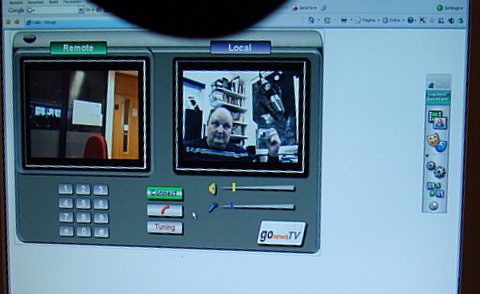
Saturday, January 12, 2008
Fill the Gap 5
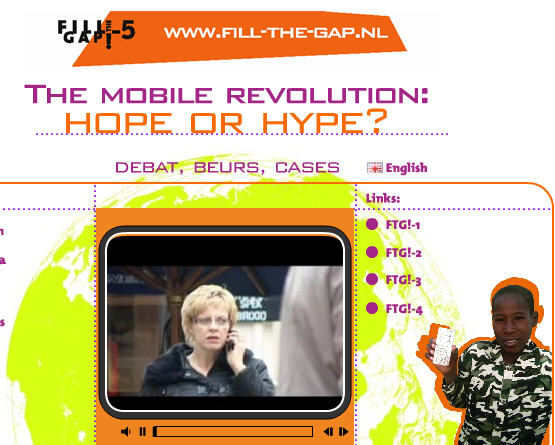
Good session yesterday afternoon in the Balie just off Leidseplein in Amsterdam. Ethan Zuckerman was one of the guest speakers and not only managed to speak, but he blogged in detail about what was said as well. This guy is brilliant - world class. Part of the secret is that he is always willing to listen before and after other people have spoken and sticks around to chat to the audience. He also raised the issue of community radio - and how it is the most effective mass media. When combined with mobile (and mobile transactions) all sorts of things can start up. Will blog more when they put the videos up.
Friday, January 11, 2008
Inspiring Afternoon
Thursday, January 10, 2008
Rwandan Soap On the Radio
Got quoted in the International Herald Tribune this past Monday, but only found the article today. Here's an extract.
In 1994, radio in Rwanda was all about hate and violence. The government used it to incite people to kill, and the killers were often seen with a gun in one hand and a receiver in the other as they tried to locate enemies.
Today, Rwandan radio is a voice of hope and reconciliation. One of its most popular programs, the soap opera "Musekeweya," or "New Dawn," is about a country divided, much like Rwanda 13 years ago, but one in which the stars find a way around the conflict.
La Benevolencija, the Dutch organization that finances and produces the show, says the characters "represent a new attitude that harkens back to a much gentler generation of Rwandans."
The program, which aired from 1996 to 1998, covered issues like women's empowerment and health, HIV, family size and conservation. PCI Media Impact says on its Web site that in one village, a group was formed to end dowry-giving, something the government has tried in vain to limit since 1961.
Jonathan Marks, director of his own broadcast media consultancy, Critical Distance in the Netherlands, said radio serials were more attractive to listeners than lectures.
"These kind of shows can get the message across in a much less obvious way, not like educational programs do," he said.
Another advantage of radio is that it is very affordable. In Rwanda, as well as other developing countries, radios are omnipresent.

In 1994, radio in Rwanda was all about hate and violence. The government used it to incite people to kill, and the killers were often seen with a gun in one hand and a receiver in the other as they tried to locate enemies.
Today, Rwandan radio is a voice of hope and reconciliation. One of its most popular programs, the soap opera "Musekeweya," or "New Dawn," is about a country divided, much like Rwanda 13 years ago, but one in which the stars find a way around the conflict.
La Benevolencija, the Dutch organization that finances and produces the show, says the characters "represent a new attitude that harkens back to a much gentler generation of Rwandans."
The program, which aired from 1996 to 1998, covered issues like women's empowerment and health, HIV, family size and conservation. PCI Media Impact says on its Web site that in one village, a group was formed to end dowry-giving, something the government has tried in vain to limit since 1961.
Jonathan Marks, director of his own broadcast media consultancy, Critical Distance in the Netherlands, said radio serials were more attractive to listeners than lectures.
"These kind of shows can get the message across in a much less obvious way, not like educational programs do," he said.
Another advantage of radio is that it is very affordable. In Rwanda, as well as other developing countries, radios are omnipresent.

Wednesday, January 09, 2008
French Touch
The French Foreign Minister Bernard Kouchner has responded to yesterday's comments by President Nicolas Sarkozy saying he did "not completely" agree with abandoning broadcasts in foreign languages by the "France-Monde" consortion to be set up this year. It sounds a bit like they're moving discussions more in the form of "BBC Global News" construction. I still maintain cutting foreign language TV would be silly. Foreign language radio needs an overhaul though.
"The president has expressed his opinion and it is he who will take the decision," Mr Kouchner is quoted as saying. "But the consultation period has barely begun and the conception period is not over," he stressed, while highlighting the need to "reflect with three entities" (TV5, France 24 and RFI).
"The president has expressed his opinion and it is he who will take the decision," Mr Kouchner is quoted as saying. "But the consultation period has barely begun and the conception period is not over," he stressed, while highlighting the need to "reflect with three entities" (TV5, France 24 and RFI).
FT's take on Sarkozy's vision of a 'BBC' for France
FT.com / Home UK / UK - Sarkozy's vision of a 'BBC' for France
I see the even the FT is confused. BBC World Service is only radio. I think Ben means the "Global News Division" of the BBC, which runs in 33 languages rather than Sarkozy's proposed mono-lingual network.
I see the even the FT is confused. BBC World Service is only radio. I think Ben means the "Global News Division" of the BBC, which runs in 33 languages rather than Sarkozy's proposed mono-lingual network.
Murphy VHF set 1960's
A quote for the day (via Tomi T Ahonen) of Digital Korea fame. The CEO of Sandisk (the guys who make the removable memory cards), Eli Harari, says "Wireless is the mother of all markets." I agree there. Not sure they meant this wireless though.
Tuesday, January 08, 2008
New Year Borrel for New Media
Biz is booming in Amsterdam. New media is clearly where the fun is at the moment. There will be some big shakeouts this year, but fun while it lasts. My son Chris and I are in there somewhere. Henk-Jan takes great photos.
France 24- Sarkozy Remark is Bonkers
I don't pretend to know much about French politics. That's because my French isn't good enough. But I do know quite a bit about international media. And the announcement earlier today (8 January) by President Nicolas Sarkozy is just plain stupid. Although it is true that French international broadcasting suffers from a lack of coordination, Sarkozy also seems to believe if France wants to share ideas with the world, that is best done in French - with some foreign language subtitles. If that were true, CNN with French subtitles would have a major market share in France at this moment. Subtitling doesn't work because it can only help you with the content not the context of a story.
"I think a public channel, France-World, that would retain the identity of each of the participants, can only speak French," the president said. "I'm not inclined to use taxpayers' money to broadcast a channel that doesn't speak French," he is quoted as saying.
He has called for a new state-owned channel called France Monde, bringing together the resources of TV5, France 24 and Radio France Internationale [RFI], to be set up "this year" and to broadcast only in "French". "There could perfectly well be subtitles according to region - Spanish, Arabic, English - to provide France's point of view". The idea is to create "as rapidly as possible, in any case this year" a "France Monde [France World] label, that is a holding company that would unite the resources of TV5, France 24 and RFI in ways still to be debated" to "provide a much more imposing French presence than at present".
This is clearly a case of death by integration. RFI and France 24 are two completely different beasts. Personally, I think France 24 is way ahead of its radio counterpart. That's because they have integrated their foreign language production in Arabic and English from day one. So they share resources, but craft each channel according to the target area. That's because they are aware that they have competition. Visiting there last month, I was impressed by the buzz in the building and the way they were putting French stories into an international context.
RFI does a good job in Africa, where its French service plays an important role in the Francophone countries. Its weakness has always been the RFI foreign language services which are relatively expensive to run, on the air for only parts of the day, and of a varying standard. They have never really embraced the web, prefering to stick with linear storytelling through radio. Integration of RFI English with France 24 English just won't work on any platform. Just compare the websites of RFI English with France 24, it is night and day.
So yes, they can all do a better job of co-operation. France could beat the US tomorrow in the international broadcasting game- infact I think the figures prove they already have. There are some obvious savings that can be made on the radio side. But a French-only policy is definitely NOT the way. For France's sake, let's hope the President has indeed confused the missions, culture, language and purpose of these organisations. And that's one hell of a confusion for just one evening. I hope he has started a debate not announced a decision.
I see the BBC coverage is phrased as though France 24 is finished and off the air. I think that shows that France 24 is making an impact if their journalists cover it in such a way.
Sarkozy's other idea of financing French public TV through a tax on Internet services (and creaming some of the profits from the private channels) has some merit, providing the French public media become a lot more accountable to the public.
I get the impression that Sarkozy has already given up on radio as a medium of influence. He interchanges the use of media and television, but never media and radio.
"I think a public channel, France-World, that would retain the identity of each of the participants, can only speak French," the president said. "I'm not inclined to use taxpayers' money to broadcast a channel that doesn't speak French," he is quoted as saying.
He has called for a new state-owned channel called France Monde, bringing together the resources of TV5, France 24 and Radio France Internationale [RFI], to be set up "this year" and to broadcast only in "French". "There could perfectly well be subtitles according to region - Spanish, Arabic, English - to provide France's point of view". The idea is to create "as rapidly as possible, in any case this year" a "France Monde [France World] label, that is a holding company that would unite the resources of TV5, France 24 and RFI in ways still to be debated" to "provide a much more imposing French presence than at present".
This is clearly a case of death by integration. RFI and France 24 are two completely different beasts. Personally, I think France 24 is way ahead of its radio counterpart. That's because they have integrated their foreign language production in Arabic and English from day one. So they share resources, but craft each channel according to the target area. That's because they are aware that they have competition. Visiting there last month, I was impressed by the buzz in the building and the way they were putting French stories into an international context.
RFI does a good job in Africa, where its French service plays an important role in the Francophone countries. Its weakness has always been the RFI foreign language services which are relatively expensive to run, on the air for only parts of the day, and of a varying standard. They have never really embraced the web, prefering to stick with linear storytelling through radio. Integration of RFI English with France 24 English just won't work on any platform. Just compare the websites of RFI English with France 24, it is night and day.
So yes, they can all do a better job of co-operation. France could beat the US tomorrow in the international broadcasting game- infact I think the figures prove they already have. There are some obvious savings that can be made on the radio side. But a French-only policy is definitely NOT the way. For France's sake, let's hope the President has indeed confused the missions, culture, language and purpose of these organisations. And that's one hell of a confusion for just one evening. I hope he has started a debate not announced a decision.
I see the BBC coverage is phrased as though France 24 is finished and off the air. I think that shows that France 24 is making an impact if their journalists cover it in such a way.
Sarkozy's other idea of financing French public TV through a tax on Internet services (and creaming some of the profits from the private channels) has some merit, providing the French public media become a lot more accountable to the public.
I get the impression that Sarkozy has already given up on radio as a medium of influence. He interchanges the use of media and television, but never media and radio.
Monday, January 07, 2008
Xobni
I am not sure whether I will upgrade to Outlook 2007 now that many features are available on line and are far more collaborative that old Outlook 2003 I am using now. These guys (their name is a backwards inbox) are using a clever piece of software that syncs with Outlook. I must confess that Neo Pro for Outlook is by far the best add-in. This promises to be even better. But will wait to see what's coooking first before switching anything. And how do we pronounce Xobni? Not a brilliant easy-to-remember name in any language I know of. But a clever scheme to get the word out though.

Bill's Last Day
A video spoof shown during the CES 2008 keynote last night by Bill Gates about his "last full day at Microsoft" in July 08. Reminds me of the spoof Bill Clinton made just before he left the White House and a scene with John Cleese in a Fish Called Wanda.
Video: Bill Gates Last Day CES Clip
This one stars the other Bill, Brian Williams, Steve Ballmer, Matthew McConaughey, Robbie Bach, Jay-Z, Bono, Steven Spielberg, George Clooney, Jon Stewart, Kevin Turner, Hillary Clinton, Barack Obama, Al Gore, Ray Ozzie and Craig Mundie. Wish I had the commission to make this one. I hope he spends his money wisely. His foundation is doing some interesting work in Africa. Not sure he always finds the best advisors, though. Dollar signs cloud their vision.
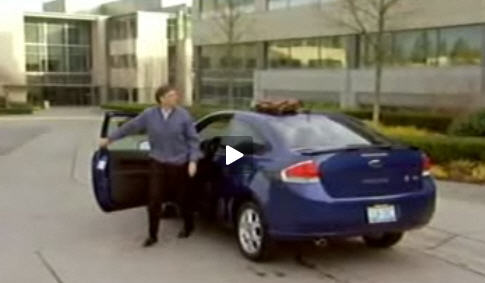
Video: Bill Gates Last Day CES Clip
This one stars the other Bill, Brian Williams, Steve Ballmer, Matthew McConaughey, Robbie Bach, Jay-Z, Bono, Steven Spielberg, George Clooney, Jon Stewart, Kevin Turner, Hillary Clinton, Barack Obama, Al Gore, Ray Ozzie and Craig Mundie. Wish I had the commission to make this one. I hope he spends his money wisely. His foundation is doing some interesting work in Africa. Not sure he always finds the best advisors, though. Dollar signs cloud their vision.

Sunday, January 06, 2008
French on the left
Now here's a nugget of information for parties. Sorting through photos of Paris, I realise that French trains run on the left. Wikipedia reveals that trains often do not operate on the same side of the road as cars do. In France, for instance, the first train lines were built by British engineers, so kept to the left. The Paris RER trains keep left, but have to operate on separate tracks within the Paris Metro area which was designed to run on the right. Another anomaly occurs in the Alsace-Moselle region, where trains keep to the right because the lines were built in the late 19th century when Alsace-Moselle had been part of Germany. Bridges at the former border allow the trains to swap sides.
Now get back to work.
Now get back to work.
Menassat 25 Hours a day?
I know things are tough in Beirut, long hours, but 25 hours in a day? Interesting site, by the way.
Saturday, January 05, 2008
Recall Campaign Volkswagen golf 1974
VW is recalling all its Golf cars made for the Dutch market in 1974 on the grounds that vibration may eventually make it difficult to open the glove compartment. Nice to see someone has a sense of humour. This reminds me of the Studer Revox campaign a decade or so back offering to renovate any original Revox amplifiers from the first years of the company. Seems they did get some back - and did what they promised to do. Thanks to Marketingfacts in the Netherlands for spotting this one.
Friday, January 04, 2008
Reality TV in Czech Republic
Six Czech hackers may go to jail for up to three years for playing around with a weather camera mounted on top of a TV tower near Krkonose which overlooks the "Giant Mountains". In many countries in Central Europe, the morning broadcasts are filled with live "webcam" type shots of various parts of the country. In a few seconds you get an idea of what the weather is like, and the current temperature is displayed on screen as well. The story goes that the hackers, famous for other publicity stunts, somehow cut the feed from the camera, grabbed some footage and then montaged what looks like a nuclear explosion onto the shot - not that difficult with editing software costing a few hundred Euros at most. They then played the video back through a laptop. So Czech Tv thought they were accessing the live webcam, when infact they were accessing the modified footage from these Czech hackers-artists. They say they did it to highlight the fact that what you see on TV is not always the real story. Czech TV doesn't see the joke and has taken them to court for tampering with the equipment and misleading the public. The group, called "Ztohoven", seem to have taken the video off their website, but the explanation is still there.
All this reminds me of projects in the UK in the late 1970's when engineers hijacked BBC transmitter networks, showing how vulnerable they were to misuse by the IRA. Broadcasters have a habit of lapsing into a false sense of security.

All this reminds me of projects in the UK in the late 1970's when engineers hijacked BBC transmitter networks, showing how vulnerable they were to misuse by the IRA. Broadcasters have a habit of lapsing into a false sense of security.

Department of Correction
2008 is going to be an interesting year, especially in traditional and "so-called" Web 2.0 media industries. I am currently making a list for clients of companies and sectors which are not going to make it to January 2009 and it's quite a long list. Bonkers business models, like those of Facebook, MySpace and Worldspace, will correct themselves this year. US$100 oil prices will sort out some members of the broadcasting business. If you're not making tagged (labeled) content then you cannot find what you've made. And mediocre content will slip further into the sea of oblivion, fortunately never to be found again. Can't talk here about the rest, but we're reaching a major tipping point....roughly where the rollercoaster is on this great picture from Flickr.
Wednesday, January 02, 2008
Rolodex
Incredible to see the response from LinkedIn. 300+ connections in 24hrs, including some queries from people who don't recall ever meeting me. Which is good, that's the way it should be.
LinkedIn reminds me a bit of the Who's Who biz in the 1980's. The publishers had, and ruined, a good brand by broadening it out so wide as to make it useless. My 1994 copy (picked up a yard sale in the States) is great guide to chief librarians of the world, who thought they were going on to better things by being listed. And of course they bought the book for their collection too. Short-term profit, long-term disaster.
LinkedIn desperately needs an upgrade to be able to grade the level of "friendship". Otherwise its just an electronic Rolodex.
LinkedIn reminds me a bit of the Who's Who biz in the 1980's. The publishers had, and ruined, a good brand by broadening it out so wide as to make it useless. My 1994 copy (picked up a yard sale in the States) is great guide to chief librarians of the world, who thought they were going on to better things by being listed. And of course they bought the book for their collection too. Short-term profit, long-term disaster.
LinkedIn desperately needs an upgrade to be able to grade the level of "friendship". Otherwise its just an electronic Rolodex.
Subscribe to:
Posts (Atom)